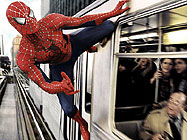|
|
|
|
Spider-Man 2
|
 |
|
Spider-Man
is an odd kind of superhero. Beyond the surprise factor inherent in his ability
to swing into a scene at high speed, he seems to possess no special strength or
ability. As played by Tobey Maguire in director Sam Raimi’s very entertaining
rendering of the Marvel Comics franchise, he is just a reasonably pumped young
man with his wits about him, and an ultra-noble mission. Plus, of course, many
emotional problems attached to his difficult double life as a masked do-gooder
and meek, aspiring photo-journalist Peter Parker – especially his inability to
come clean to Mary Jane (Kirsten Dunst).
Although
he is quintessentially a big-city dweller – and Raimi is unafraid to evoke,
with a light and fleeting touch, the film
noir ethos of dark streets and towering skyscrapers – Spider-Man is also a
pre-technological kind of hero. His sense of the location of evildoing is based
on nothing more than what he happens to glimpse down a lane, or the handy sound
of a distant police siren. There must a heck of a lot of modern crime he
misses.
It
is the villains in these stories who are technologically able, harbingers of
many scary, new forms of power. His principal foe this time is Dr Octopus (aka
Doc Ock, played with relish by Alfred Molina), an idealistic scientist
literally transformed by his own creation – a set of four arms that can wield
almighty modern forces.
No
matter how many anachronistic, corny, clumsy or discrepant elements we might be
able to detect in the comic-book myth of Spider-Man, one thing is certain:
Raimi loves them all. The Spider-Man movies have put him in touch with what he did best at the promising start of
his career, in films like the Evil Dead series and Darkman (1990). He is able to juggle a nuttily camp sense of
unreality with a heady, adolescent aura of catastrophic personal melodrama. The
combination works just as well here as it did in the first film of the series.
Raimi
and writer Alvin Sargent no longer have the luxury of being able to dwell on
the fanciful origins of this hero. They need to get the story moving straight
away. For about the first fifteen minutes, there is touch of banality: the main
complication in Peter’s life appears to be his propensity for being late for
everything from pizza deliveries to university classes. But events start to hot
up once Peter’s agonised apprehension of Mary Jane’s new love interest begins
to be juxtaposed not only with the birth of Doc Ock but some troubling
malfunctions in his spidery prowess.
Where
the former Spider-Man movie was cleverly geared around typical issues of pubescent development, this
instalment touches on what
Australia’s television rating system gingerly refers to as ‘adult themes’. Indeed, the Spider-Man films are essentially about
men and their appendages. While Peter has trouble squirting, the evil Doc
thinks with his arms. Anyone who doubts that Spider-Man 2 is a drama of male potency – both the lack and excess
of it – should pay strict attention to Mary Jane’s key, final line: “Go get
‘em, tiger”. (She looks a little sad after she says it, perhaps because in this
merrily schizo entertainment, it’s not her that he proceeds to go get.)
While
revelling in such subterranean themes, Raimi’s, offbeat, cartoonish sensibility
is also simultaneously able to capture a certain innocence long gone from
blockbuster movie entertainment, at least in
America
(Hong Kong
and Bollywood offer contrary
models, of which Raimi may be well aware). He is even able to recreate an old
staple of the romantic comedies of half-a-century ago: Mary Jane may be a
modern young woman, but it is only after comparing the memory of Spider-Man’s
kiss (a highlight of the first film) with the lip action dished out by her new
boyfriend that she can truly ponder the path her life must take.
Nothing
pales for film-geeks faster than the creative possibilities offered by
special-effects technology, so Spider-Man’s relentless motion through the air
already seems jaded to some viewers. But Raimi works hard to keep the thrills
alive in a set-piece involving a train that outdoes Brian De Palma’s work in Mission: Impossible (1996), and the gags come fast and furious in scenes that show this hero at his
most hilariously detumescent.
MORE superheroes: Elektra, Daredevil, Catwoman, Hellboy, Batman Begins, Batman Forever, Batman & Robin © Adrian Martin June 2004 |
![]()